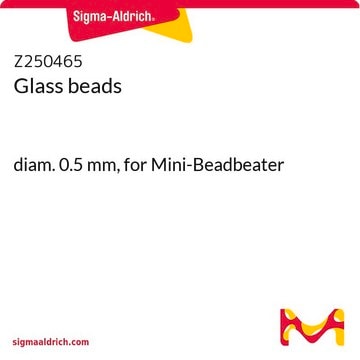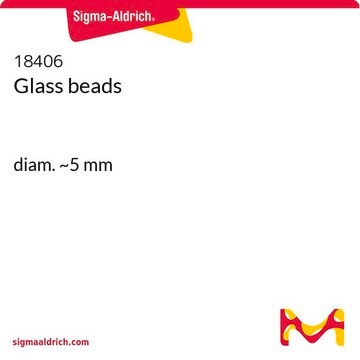G9268
Glass beads, unwashed
425-600 μm (30-40 U.S. sieve)
Synonyme(s) :
Glass beads
Se connecterpour consulter vos tarifs contractuels et ceux de votre entreprise/organisme
About This Item
Code UNSPSC :
41100000
Nomenclature NACRES :
NB.22
Produits recommandés
Taille des particules
425-600 μm (30-40 U.S. sieve)
Application
Unwashedglass beads have been used:
- in the quantification of protein in fungal colonybiofilm
- in the lysis of microglial cells for the extraction andquantification of chlorophylls and cell mortality rate
- in the extraction ofDNA and RNA from microbial communities
Code de la classe de stockage
11 - Combustible Solids
Classe de danger pour l'eau (WGK)
WGK 3
Point d'éclair (°F)
Not applicable
Point d'éclair (°C)
Not applicable
Équipement de protection individuelle
Eyeshields, Gloves, type N95 (US)
Faites votre choix parmi les versions les plus récentes :
Certificats d'analyse (COA)
Lot/Batch Number
Vous ne trouvez pas la bonne version ?
Si vous avez besoin d'une version particulière, vous pouvez rechercher un certificat spécifique par le numéro de lot.
Déjà en possession de ce produit ?
Retrouvez la documentation relative aux produits que vous avez récemment achetés dans la Bibliothèque de documents.
Les clients ont également consulté
Ruoyun Li et al.
Journal of proteomics, 203, 103377-103377 (2019-05-19)
The molecular mechanism of Saccharomyces cerevisiae tolerant to ethanol stress remains to be further elucidated. In this study, a comprehensive analysis based on RNA-seq and iTRAQ LC-MS/MS was used to investigate the global mechanism of S. cerevisiae strain Sc131 in
Xavier Garcia-Ortega et al.
Frontiers in bioengineering and biotechnology, 3, 107-107 (2015-08-19)
The most commonly used cell disruption procedures may present lack of reproducibility, which introduces significant errors in the quantification of intracellular components. In this work, an approach consisting in the definition of an overall key performance indicator (KPI) was implemented
Zinc oxide nanoparticles hinder fungal biofilm development in an ancient Egyptian tomb
Gambino M, et al.
International Biodeterioration & Biodegradation, 122, 92-99 (2017)
Production of long chain omega-3 fatty acids and carotenoids in tropical areas by a new heat-tolerant microalga Tetraselmis sp. DS3
Hsin P T, et al.
Food Chemistry, 682-690 (2016)
Daniel R Leadbeater et al.
Microbiome, 9(1), 48-48 (2021-02-19)
Salt marshes are major natural repositories of sequestered organic carbon with high burial rates of organic matter, produced by highly productive native flora. Accumulated carbon predominantly exists as lignocellulose which is metabolised by communities of functionally diverse microbes. However, the
Notre équipe de scientifiques dispose d'une expérience dans tous les secteurs de la recherche, notamment en sciences de la vie, science des matériaux, synthèse chimique, chromatographie, analyse et dans de nombreux autres domaines..
Contacter notre Service technique











